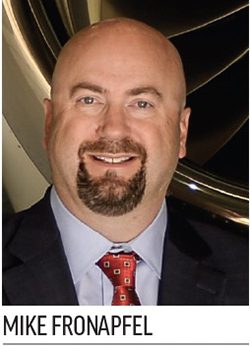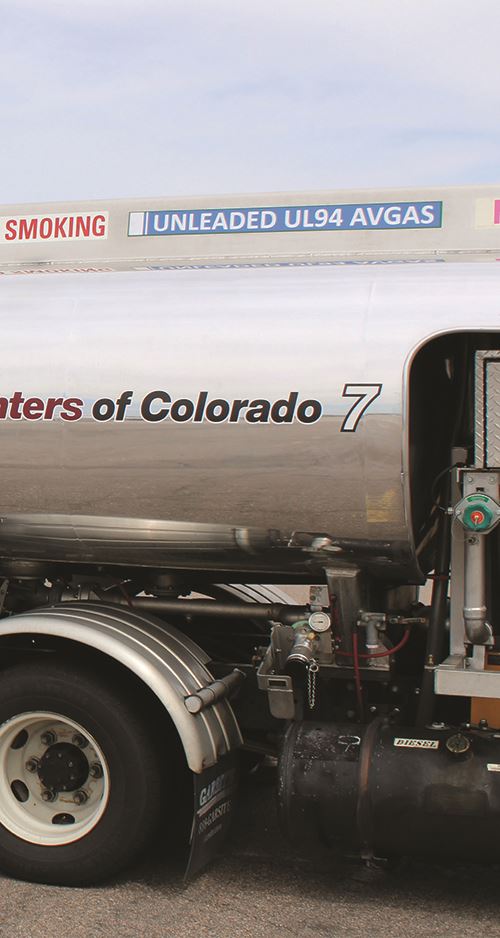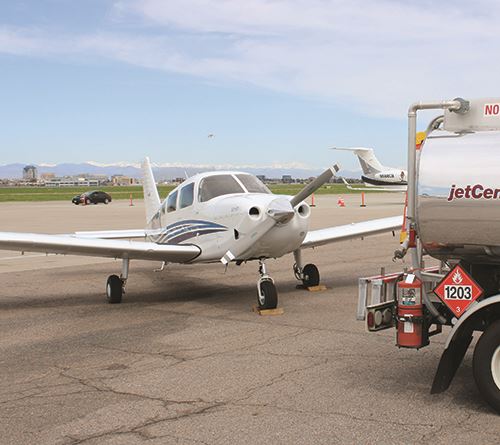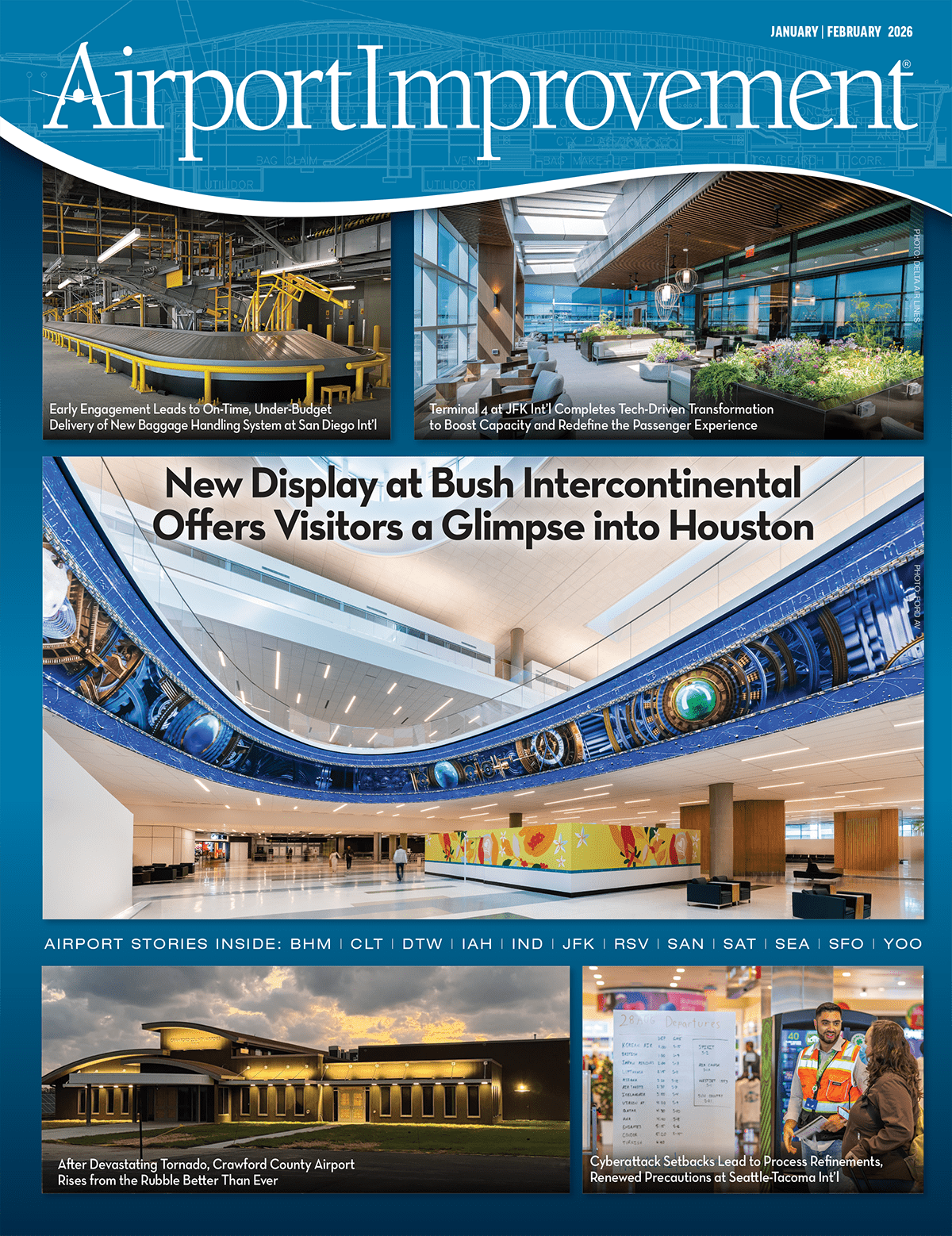In early May, Centennial Airport (APA) in Englewood, CO, became that state’s first airport to offer unleaded aviation gas for piston-engine aircraft. The active general aviation facility is even offsetting associated costs for early adopters who buy the more expensive eco-friendly alternative.
In early May, Centennial Airport (APA) in Englewood, CO, became that state’s first airport to offer unleaded aviation gas for piston-engine aircraft. The active general aviation facility is even offsetting associated costs for early adopters who buy the more expensive eco-friendly alternative.
 Executive Director Mike Fronapfel says that working with partners to transition from the longtime industry standard 100LL (low lead) to UL94 (unleaded) is a way for APA to be a good steward of the environment, industry and local community. “We felt it was the right thing to do to start moving in that direction and be proactive about it,” he explains.
Executive Director Mike Fronapfel says that working with partners to transition from the longtime industry standard 100LL (low lead) to UL94 (unleaded) is a way for APA to be a good steward of the environment, industry and local community. “We felt it was the right thing to do to start moving in that direction and be proactive about it,” he explains.
Fronapfel predicts that other airports throughout the country will soon follow suit. Some are likely to interpret an official statement the U.S. Environmental Protection Agency released in mid-October as a precursor to subsequent regulatory action from the FAA. In short, the statement said that emissions from aircraft using leaded fuel “cause or contribute to air pollution which may reasonably be anticipated to endanger public health…”
|
Project:
Location:
Fixed Base Operator/Key Fuel Seller: Unleaded Product: UL94 Supplier: Swift Fuels LLC Customer Incentives: Up to $110 reimbursement for supplemental type certificates required to use unleaded fuel; airport is also initially subsidizing price difference between UL94 & 100LL Key Benefit: Eliminating harmful neurotoxins present in traditional leaded avgas |
Not surprisingly, airports in California were among the first to begin the transition from 100LL. Currently, 15 fueling facilities in California are now using UL94 instead of 100LL for hundreds of qualified aircraft. In fact, Chris D’Acosta, chief executive officer of Swift Fuels, notes that Reid Hillview Airfield in San Jose has eliminated the sale of 100LL outright by only allowing the sale of UL94 to its customers and flight schools. Sebring Regional, DeLand Municipal and Naples Municipal in Florida were also early pioneers in the transition. In total, an estimated 36 public use airports currently sell UL94 unleaded avgas.
The industry-wide stopwatch regarding the issue officially started last year when FAA announced a public-private initiative to safely eliminate the use of leaded aviation fuel by the end of 2030 without adversely affecting the existing piston engine fleet. Beyond FAA and EPA, the cooperative effort involves fuel producers and distributors, airport operators, communities that support general aviation airports, engine and aircraft manufacturers, research institutions and environmental experts.
The initiative goes by the moniker of EAGLE, short for Eliminate Aviation Gasoline Lead Emissions, and has four primary components:
- developing infrastructure for unleaded fuels and assessing commercial viability;
- supporting research and development and technology innovations;
- continuing to evaluate and authorize safe unleaded fuels; and
- establishing necessary policies and regulations.
EAGLE builds on the existing work of the Piston Engine Aviation Fuels Initiative, an FAA program established in 2014 to support the evaluation of candidates to replace traditional leaded avgas.
UL94, the unleaded fuel APA sells, is a 94+ motor-octane aviation gasoline that is approved by FAA as an alternative to 100LL for specified aircraft. It does not contain tetraethyl lead (the harmful neurotoxin eliminated from auto fuel in the 1990s) and meets the minimum octane requirements of more than 125,000 aircraft as a “drop-in ready” avgas without the need for aircraft modifications or hardware changes.
 Swift Fuels LLC, the sole supplier of UL94 nationwide, has produced the product at its Indiana facility since 2015. “We’re leaders in the industry on a global scale,” says D’Acosta. “Our mission is getting certification from the FAA and the ASTM (American Society for Testing and Materials) production specification for the full replacement of 100LL (leaded) avgas using our 100R avgas. UL94 achieved this for over 70% of the FAA-certified fleet and is just the initial transition toward that ultimate goal of full replacement with 100R, a 10% renewable fuel.”
Swift Fuels LLC, the sole supplier of UL94 nationwide, has produced the product at its Indiana facility since 2015. “We’re leaders in the industry on a global scale,” says D’Acosta. “Our mission is getting certification from the FAA and the ASTM (American Society for Testing and Materials) production specification for the full replacement of 100LL (leaded) avgas using our 100R avgas. UL94 achieved this for over 70% of the FAA-certified fleet and is just the initial transition toward that ultimate goal of full replacement with 100R, a 10% renewable fuel.”
Making the Change
APA, a reliever for Denver International Airport to the northeast, logged 302,660 flight operations last year. More than 850 aircraft and 120 businesses are based at the active general aviation airport. Tenants include corporate flight departments, charter companies, fractional ownership operators, large flight schools, medevac and air ambulance services, military and Department of Defense entities, cargo businesses, and research and development companies.
Taking the statewide lead to provide unleaded gas was a shared goal for APA officials, the airport authority board and local residents. “We had a lot of members in the community who were very concerned about the lead emissions from aircraft fueling,” says Fronapfel.
After deciding to pursue the change, airport leaders met with flight schools on the airfield to ensure that they would use the new fuel if it were available. “Overwhelmingly, they were in favor of it, with the exception of one that flies primarily Cirrus aircraft that can’t use UL94,” Fronapfel notes. According to Swift, the 100R alternative hopes to address this need in the months to come.
The Arapahoe County Public Airport Authority Board, which owns and operates APA, recognized that switching to UL94 is a partnership that requires cooperation across the facility. “If we went down this path, they weren’t going to just sit there with a tank of fuel going stale,” Fronapfel explains.
“We’re really committed to the transition,” he adds. “In order to demonstrate that and for UL94 to gain a foothold here at Centennial, the Board felt the airport needed to help subsidize it—at least initially.”

This March, the Arapahoe County Public Airport Authority Board authorized APA to reimburse based aircraft owners up to $110 each for a supplemental type certificate required to use UL94 fuel. “We’ve done it for three of the four major flight schools here, and that really helped convince jetCenters of Colorado [the fixed base operator that sells about 60% of all avgas on the field] that there is a market here,” Fronapfel explains.
As of June 29, APA had processed supplemental type certificate reimbursements for 84 aircraft, including 69 owned by flight schools at the airport. In fact, a 2022 Piper Archer owned by the Aspen Flying Club flight school was the first aircraft to be fueled with UL94 at APA. The supplemental type certificate entitles the holder to all future FAA-authorized supplemental type certificates for upcoming unleaded fuels from Swift Fuels at no extra cost, notes D’Acosta.
Leaders from the airport and fixed base operator also discussed the option of APA subsidizing the purchase of a new fuel tank and fuel truck for UL94, but jetCenters opted to dedicate one of its existing tanks and trucks to unleaded fuel. It also covered the associated costs of switching the equipment from 100LL to UL94.
To further encourage the transition, APA is currently covering the cost difference between UL94 and 100LL—about $1 per gallon. “We thought it would make sense, at least for the remainder of 2023, to subsidize the cost of the fuel to the user so they’re not paying a penalty to be environmentally friendly,” Fronapfel explains.
Each week, personnel at jetCenters complete a market analysis, checking the price of both fuels to determine the prevailing price differential. At the end of each month, the fixed base operator makes a payment request to the airport for that amount. “The out-the-door price to the customers is the same,” Fronapfel notes.
Let It Flow
In May, jetCenters of Colorado pumped 8,373 gallons of UL94—about 15% of all fuel (avgas and jetA) sold at the airport. “We thought that was great,” remarks Fronapfel. While other fuel providers at APA currently do not offer UL94, Fronapfel considers the volume jeCenters is pumping a solid start for the full transition to more environmentally friendly fueling at APA.

To cover its current per-gallon and supplemental type certificate subsidy programs, APA is using airport funds originally earmarked for an environmental study and the preliminary design of an air traffic control tower. That project is still in the works, but the airport received a Bipartisan Infrastructure Law grant for it, thus freeing up its own funds for the UL94 transition.
When officials review the airport budget at the end of this year, the Board will determine whether the subsidies are necessary and/or financially feasible for 2024.
Some community members expressed concerns about subsidies attracting too much additional traffic to the airport, but that hasn’t been the case so far. “At least the first three months, all the unleaded fuel was sold to based customers,” Fronapfel reports, acknowledging that could change. “We had zero transient aircraft that flew into Centennial to purchase fuel.”
Looking ahead, 100LL will be available at APA for the foreseeable future, as the process of introducing UL94 or any other unleaded fuels will take time. Fronapfel notes that one of the advantages of UL94 is that it can be mixed at any ratio with 100LL.
That said, he expects demand for the environmentally friendly option to grow at APA and elsewhere. “When the study comes out this year from the EPA, I think there’s going to be a lot more pressure for people to convert,” he says. “I hope [other airports] take our example and run with it.”
D’Acosta declined to share specific information about the volume of UL94 being used nationwide, noting that Swift Fuels is a privately held company. “Demand is certainly high, and it’s growing,” he says, adding that production is doubling every few months.


 facts&figures
facts&figures

